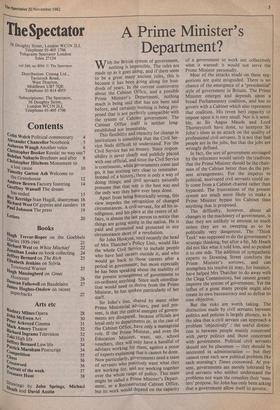A Prime Minister's Department?
With the British system of government, nothing is impossible. The rules are made up as it goes along, and if there seem to be a great many ancient rules, this is because it has been going along for hun- dreds of years. In the current controversy about the Cabinet Office, and a possible Prime Minister's Department, nothing much is being said that has not been said before, and certainly nothing is being pro- posed that is not perfectly compatible with the system of Cabinet government. The Cabinet Office itself is neither long- established nor immutable.
This flexibility and capacity for change in institutions is something that the Civil Ser- vice finds difficult to understand. For the Civil Service has no money. Since respon- sibility is never clearly and publicly placed with one official, and since the Civil Service is continuous, while governments come and go, it has nothing very clear to remember. Instead of a history, there is only a way of doing things; and civil servants naturally presume that that way is the best way and the only way they have ever been done. Apart from being historically wrong, this view impedes the recognition of changed circumstances. A civil servant, for all his in- telligence, and his place at the centre of af- fairs, is almost the last person to notice that things are going wrong in the nation. He is paid and promoted and protected in any circumstance short of a revolution. Sir John Hoskyns, until recently the head of Mrs Thatcher's Policy Unit, would like the whole Civil Service to include people who have had careers outside it, and who would go back to those careers after a period in government; but more especially he has been speaking about the inability of the present arrangement of government to co-ordinate anything. Since such coordina- tion would need to derive from the Prime Minister, he has spoken particularly of her staff.
Sir John's line, shared by many other Prime Ministerial advisers, past and pre- sent, is that the central energies of govern- ments are dissipated, because officials are loyal only to departments or, in the case of the Cabinet Office, have only a managerial role. If the Prime Minister, and even the Education Minister, want, say, school vouchers, they will only have a handful of advisers working for them, against a posse of experts explaining that it cannot be done. Now particularly, governments need a team of servants who positively want what they are working for, and are working together over the whole range of policy. This team might be called a Prime Minister's Depart- ment, or a Reconstructed Cabinet Office, but its work would depend on the capacity
of a government to work out collectively what it wanted: it would not serve the Prime Minister personally.
Most of the attacks made on these sug- gestions are quite misguided. There is no chance of the emergence of a 'presidential' style of government in Britain. The Prime Minister emerges and depends upon a broad Parliamentary coalition, and has to govern with a Cabinet which also represents that coalition. His (even her) capacity to impose upon it is very small. Nor is it sensi- ble, as Sir Angus Maude and Lord Thorneycroft have done, to interpret Sir John's ideas as an attack on the quality of professional civil servants. It is not that bad people are in the jobs, but that the jobs are wrongly defined.
In fact, the sort of government envisaged by the reformers would satisfy the tradition that the Prime Minister should be the chair- man of the Cabinet better than do the pre- sent arrangements. For the impetus to political, motivated civil servants could on- ly come from a Cabinet chaired rather than bypassed. The frustrations of the present system are much more likely to make a Prime Minister bypass his Cabinet than anything that is proposed.
The difficulty, however, about all changes in the machinery of government, is that they are unlikely to amount to much unless they are so sweeping as to be politically very dangerous. The 'Think Tank' was supposed to do the government's strategic thinking, but after a bit, Mr Heath did not like what it told him, and so pushed it to one side. The addition of sympathetic experts to Downing Street comforts the Prime Minister's sorrows, and can strengthen his resolve (it may, for instance, have helped Mrs Thatcher to do away with the Clegg Commission), but cannot greatly improve the system of government. Yet the influx of a great many people might also create its own bureaucracy and so defeat its own objective.
But the risks are worth taking. The distinction made by civil servants between politics and policies is largely phoney, as is the idea that a civil servant can approach a problem 'objectively' : the useful distinc- tion is between people mainly concerned with party politics and those concerned with government. Political civil servants should not be placemen — they should be interested in administration — but they cannot treat each new political problem like each morning's Times crossword. At pre- sent, governments are merely tolerated by civil servants who neither understand the problems nor want the remedies their 'mas- ters' propose. Sir John has only been asking that a government allow itself to govern.










































 Previous page
Previous page